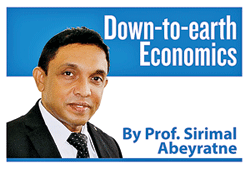Your brainy buddy
View(s):
Students watch robotic fishes at an educational base of AI in Handan, in China’s northern Hebei province on May 25, 2023. (Photo by AFP)
One of my colleagues – a University teacher -, while reading a project assignment submitted by a student, found the following few lines amid the text:
“I don’t know the background of how the outcomes of this data set were determined because I am an AI language model…. As an AI language model, I lack the subjective knowledge necessary to assess the effects of a data set….”
The assignment was part of the assessment process, related to a quantitative subject area within which statistical data techniques have to be studied.
The teacher, who recognised the few lines there as quite unusual to be part of the student’s own writing, started reading it again with curiosity. Then he realised that the assignment was not the student’s independent work. It appeared to have been supported by an Artificial Intelligent (AI) powered “chatbot” software package – an Internet-based computer programme that understands human languages and has the ability to interact with humans and to do creative work for them.
The student has been smart enough to get the help of an AI-powered chatbot to do the assignment, but not so smart to remove the traces of his or her unethical acts from the text. It’s not a secret that all over the world, the educational institutes too have to work constantly to find the ways and means of dealing with such acts of violating academic integrity.
AI-powered companion
It is only a few months now since several AI-powered Apps such as ChatGPT, Ask AI and Claude AI, were released in the market. And they are growing at an exponential speed. At least some of you may want to ask the question, “what are these?” Perhaps, a correct way of asking that question may be “who are they?” because they are some “intelligent beings” created by human beings.
They are automated companions that you can keep with you (in your technological devices such as computer or smartphone or even a robot) for communication and other services. Presumably, if we are talking about the subject area of “knowledge”, they can perform any task quickly and without you taking any effort to do that. They will answer your questions, find the sources of information, bring the facts and figures from the worldwide web, write your papers, do your projects or secretarial work, teach you on any subject, and even publish a book under your name.
 They are superfast than humans so that, for example, they can finish comprehending a 100,000-word book in a matter of seconds! We have noticed that already their trial versions are available in your computers and smartphones to impress you so that it would not surprise me if you are tempted to spend a few dollars to buy an AI-powered companion for you too.
They are superfast than humans so that, for example, they can finish comprehending a 100,000-word book in a matter of seconds! We have noticed that already their trial versions are available in your computers and smartphones to impress you so that it would not surprise me if you are tempted to spend a few dollars to buy an AI-powered companion for you too.
AI-powered language models are already in use by some of the global companies doing business in the areas of knowledge, information and data analyses, publishing and dissemination, and other creative work. However, they are only a fraction of the latest technological transformation.
While AI-powered tasks-performing has been conquering in almost every area of living and working, it can be used for a better world than this or a worse world than this, while the technology can be abused too when it is handled by such humans who are guided by many different motives.
4th Industrial Revolution
Although we have so much to talk about AI revolution in the world, my effort today is to shed some light on the economics of technological transformation and to pinpoint Sri Lanka’s position there. The progress towards most-modern technological standards is an essential component of the industrialisation process for any developing country. The most-modern technological standards fall under the title, 4th Industrial Revolution or 4th IR.
Whenever we say 4th IR, it naturally implies that there must be IRs lined up in a row before that – 1st, 2nd and 3rd Industrial revolutions, which the world has already passed through. The 1st IR refers to the adoption of machines in production which started mostly in Britain in the 18th century. While the 2nd IR refers to the use of new energy sources in production, particularly the use of electricity, the 3rd IR is for the automation process with the use of electronics, IT and robotics.
Finally, the 4th IR means the use of today’s technological standards using what was mentioned earlier – the Artificial Intelligence (AI), as well as the adoption of related technologies known as Internet of Things, Smart Technology, Big Data, and 3D printing.
Inputs and outputs
Technology is simply the “way of converting inputs into outputs”, while it is nothing other than a “stock of knowledge” that a nation acquires and puts into practice. The four levels of IR show how the world has developed this stock of knowledge that is used in performing tasks of producing goods and services.
There are three steps in the process of adopting technology: Invention, innovation, and diffusion. Invention is the creation or the discovery of new knowledge. Innovation is its application in performing given tasks. Diffusion is the spread of new technology with its commercialisation.
As far as the use of new technology in a country is concerned, the last step – diffusion can take place by purchasing, emulating, and attracting foreign direct investment (FDI). Purchasing requires foreign exchange, while emulation requires re-engineering capabilities. For a developing country which lacks both, perhaps the easiest way of acquiring new technology has been the opening of the economy and attracting FDI, which naturally comes with technology and other elements as a package.
Trial versions of some of the technologies such as those of the new AI language models may be available free of charge for limited usage, for the purpose of marketing and promotion. But going beyond the limited usage in order to enhance its national benefit needs much more.
Where is Sri Lanka?
A fair assessment would reveal that Sri Lanka’s technological standards in production remains around the 2nd IR level, with some fragmented adoption of elements from the 3rd IR level – a main bottleneck that makes the country uncompetitive in the competitive world.
International comparisons clearly reveal that Sri Lanka’s technological deepening in production lags far behind. Export data from among the Asian countries reveal that high-tech products in Sri Lanka’s export mix fall short of that of most of our neighbouring countries in the region. Technological transformation takes time, so that overnight transition from our 2nd IR level to 4th IR level is an impossibility.
Sri Lanka needs to start the process by identifying the sources of slowdown in technological deepening. The most pressing source of technological backwardness of the country is nothing other than its “isolation” from the fast-moving rest of the world. Sri Lanka’s self-styled isolation is primarily a result of its protectionist policies, un-reformed regulatory barriers, and the lack of policy and political stability.
One of the good news however is that inspite of all these barriers, Sri Lanka’s ICT sector has progressed well in the past few years. There are also a handful of companies performing silently and catering to global demand for technological products that fall under 3rd and 4th IR levels.
But there is hardly any demand from domestic sources, because our production processes still depend more on 2nd or 3rd IR standards than on 4th IR standards. In order to catch up with the fast-moving world with the support of 4th IR, Sri Lanka has to take a big leap forward.
Potentials for destructions
By the way, by looking at AI-powered technological developments from a different angle, one could argue that such technological advancements may destroy human intelligence and creativity. Some human skills become redundant too. They could wipe out many jobs in the world either because such jobs can be performed by AI-powered software or hardware, or because many people’s skills no longer fit into work with AI-powered machines.
However, staying away from the world would not save us too. The rapid technological progress in the world, perhaps, has the potential to carry much more complex destructions one day in the future than simple job losses. They would alter our economic and political life and may even create more destructive AI forces in the future.
(The writer is a Professor of Economics at the University of Colombo and can be reached at sirimal@econ.cmb.ac.lk and follow on Twitter @SirimalAshoka).
Hitad.lk has you covered with quality used or brand new cars for sale that are budget friendly yet reliable! Now is the time to sell your old ride for something more attractive to today's modern automotive market demands. Browse through our selection of affordable options now on Hitad.lk before deciding on what will work best for you!


